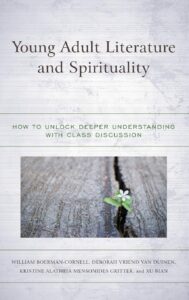Have you ever picked up a young adult book and found that your reading experience was spiritual in a way that you hadn’t expected? Perhaps the book wasn’t dealing overtly with religious themes, but you found God leading you to a deeper understanding of your faith. As a Christian educator, do you endeavor to support your students in exploring literature in new ways that build capacity for deep conversations that nurture academic and spiritual formation? Young Adult Literature and Spirituality: How to Unlock Deeper Understanding with Class Discussion (Boerman-Cornell et al.) answers these questions by asserting that some young adult literature can be read as prayer and that using methods traditionally reserved for analyzing sacred texts can open pathways for classroom discussions that dig below the surface themes to uncover deeper meaning.
[U]sing methods traditionally reserved for analyzing sacred texts can open pathways for classroom discussions that dig below the surface themes to uncover deeper meaning.
Building off of the work of Josh Larson’s book Movies are Prayers: How Films Voice Our Deepest Longings, Boerman et al. identifies eleven prayers that can be found in young adult literature and pairs them with texts that exemplify each prayer. The eleven prayers include prayers of lament, yearning, anger, confession, equanimity, thankfulness, reconciliation, obedience, contemplation, joy, and pilgrimage. The authors pair each prayer with a specific novel and practice for discussion. For example, the book identifies the text Goodbye Days by Jeff Zentner as a prayer of confession. Zentner’s novel explores the tragedy of a fatal accident due to texting while driving from the point of view of the friend who texted the driver. As the main character, Carver, experiences deep grief over the loss of his friends, he also wrestles throughout the novel with wanting to confess and escaping the pain of confession (Boerman-Cornell et al. 37). This prayer of confession helps the reader consider ways in which confession can be helpful in healing and ways in which confession fails to solve problems.
The authors pair each prayer with a specific novel and practice for discussion.
In addition to reading books as prayers, Young Adult Literature and Spirituality presents a variety of methods for leading class discussion that have been used for centuries by spiritual leaders to examine sacred texts. Often, this involves taking a look at a smaller portion of text to find meaning rather than examining the text as a whole. For example, Internment by Samira Ahmed, a dystopian novel in which the main character’s family is sent to an internment camp simply because they are Muslim, serves as a prayer of lament. This book can be meaningfully discussed using the practice of Florilegium, a method introduced to the authors through the podcast Harry Potter and the Sacred Text. This method invites readers to highlight a specific sentence that sparks meaning and pair it with another meaningful sentence. The teacher guides the students in making connections between the two sentences and applying these connections to the broader themes of the book. This is an abridged version of this article. To read more, subscribe to the print or digital edition of Christian Educators Journal.
Dr. Christine Scholma pulls on her experiences from teaching students with disability for 12 years to prepare preservice teachers to make an impact on the field as an Assistant Professor of Special Education at Trinity Christian College. Scholma also serves as the Co-director of the Alexander DeJong Center for Special Education, a partnership with Elim Christian Services, an agency that suppports children and adults with disabilities. Scholma was recently named Co-chair of the Dolly Gray Award for disability representation in children’s and young adult literature. Additionally, Scholma presents at local, national, and international conferences on the topics of belonging for students with intellectual disabilities (ID) in postsecondary education, sexuality education for students with ID, disability representation in children’s literature, and design thinking in education.
Resources
Boerman-Cornell, William, et al. Young Adult Literature and Spirituality: How to Unlock Deeper Understanding with Class Discussion. Rowman & Littlefield, 2023.
Bradley, Kimberley Brubaker. The War That Saved My Life. The Text Publishing Company, 2016.
Larsen, Josh. Movies Are Prayers: How Films Voice Our Deepest Longings. Intervarsity, 2017. Zentner, Jeff, and Grzegorz Komerski. Goodbye Days. Wydawnictwo Jaguar, 2017.
